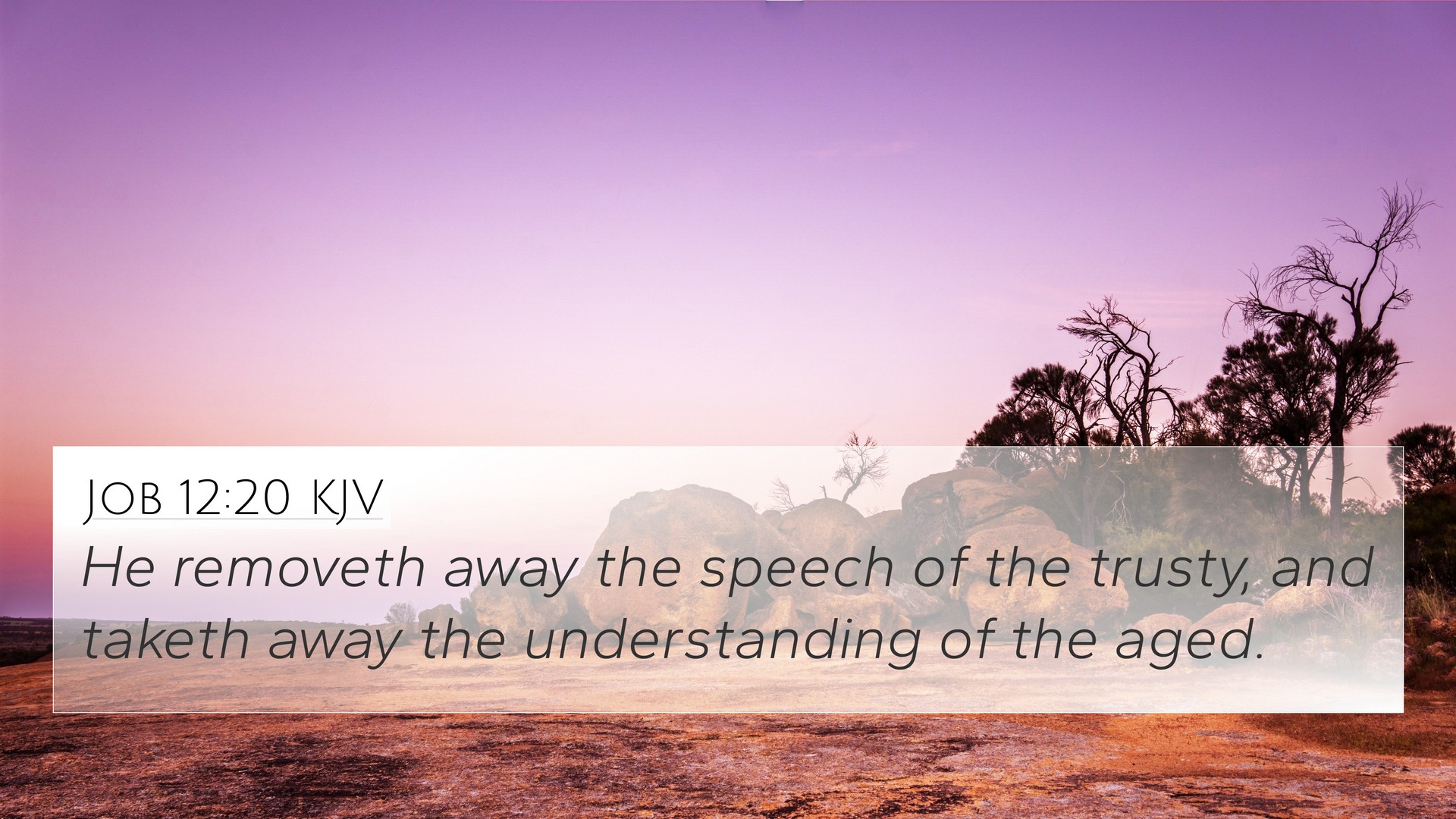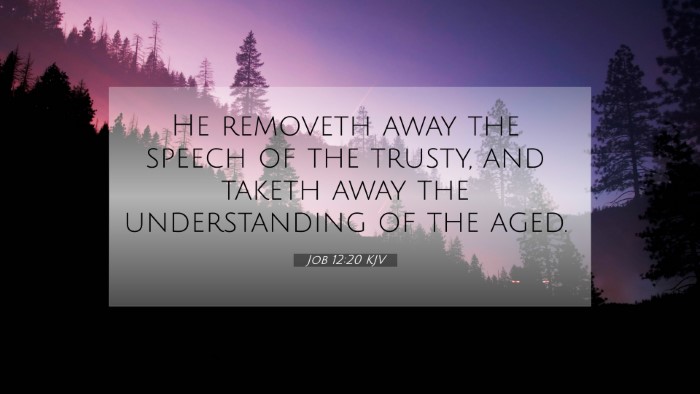Old Testament
Genesis Exodus Leviticus Numbers Deuteronomy Joshua Judges Ruth 1 Samuel 2 Samuel 1 Kings 2 Kings 1 Chronicles 2 Chronicles Ezra Nehemiah Esther Job Psalms Proverbs Ecclesiastes Song of Solomon Isaiah Jeremiah Lamentations Ezekiel Daniel Hosea Joel Amos Obadiah Jonah Micah Nahum Habakkuk Zephaniah Haggai Zechariah MalachiJob 12:20 Similar Verses
Job 12:20 Cross References
He removeth away the speech of the trusty, and taketh away the understanding of the aged.
Uncover the Rich Themes and Topics of This Bible Verse
Listed below are the Bible themes associated with Job 12:20. We invite you to explore each theme to gain deeper insights into the Scriptures.
Job 12:20 Cross Reference Verses
This section features a detailed cross-reference designed to enrich your understanding of the Scriptures. Below, you will find carefully selected verses that echo the themes and teachings related to Job 12:20 KJV. Click on any image to explore detailed analyses of related Bible verses and uncover deeper theological insights.

Job 17:4 (KJV) »
For thou hast hid their heart from understanding: therefore shalt thou not exalt them.

Job 12:24 (KJV) »
He taketh away the heart of the chief of the people of the earth, and causeth them to wander in a wilderness where there is no way.

Job 39:17 (KJV) »
Because God hath deprived her of wisdom, neither hath he imparted to her understanding.

Proverbs 12:22 (KJV) »
Lying lips are abomination to the LORD: but they that deal truly are his delight.

Proverbs 12:19 (KJV) »
The lip of truth shall be established for ever: but a lying tongue is but for a moment.

Isaiah 3:1 (KJV) »
For, behold, the Lord, the LORD of hosts, doth take away from Jerusalem and from Judah the stay and the staff, the whole stay of bread, and the whole stay of water.
Job 12:20 Verse Analysis and Similar Verses
Understanding Job 12:20
Job 12:20: "He taketh away the heart of the chief of the people of the earth, and causeth them to wander in a wilderness where there is no way."
Context of the Verse
This verse appears in the discourse of Job, a figure who grappled with immense suffering and questioned the justice of God. Job asserts that God is sovereign over all creation, including the intellect and understanding of leaders.
Meaning and Insights
- Divine Control: According to Matthew Henry, this verse underscores God’s ability to take away the wisdom and understanding from the prominent and influential people on earth, reinforcing the idea that human authority is ultimately under divine control.
- Consequences of Sin: Albert Barnes notes that when leaders are devoid of wisdom or understanding, they inevitably lead their people astray. This is a warning of the spiritual condition of the leaders that affects the entire community.
- The Importance of Leadership: Adam Clarke emphasizes that the heart refers to the inner faculties necessary for righteous leadership. When God withdraws these qualities, leaders may find themselves lost, ineffective, or leading their people into chaos.
- Human Vulnerability: All commentaries point out the inherent vulnerability of humans to divine intervention. This perspective shifts reliance from human power to God's ultimate authority and wisdom.
- Wilderness Experience: The metaphor of wandering in a wilderness symbolizes a state of confusion, lack of direction, and spiritual desolation, indicating that leaders without divine guidance lead their people into despair.
Bible Cross-References
Job 12:20 connects with several other scriptures that illustrate the themes of God's sovereignty over human wisdom and leadership. Here are some relevant cross-references:
- Psalms 107:40: "He poureth contempt upon princes; and causeth them to wander in the wilderness, where there is no way."
- Isaiah 19:3: "And the spirit of Egypt shall fail in the midst thereof; and I will destroy the counsel thereof; and they shall seek to the idols, and to the charmers, and to them that have familiar spirits, and to the wizards."
- Proverbs 21:1: "The king's heart is in the hand of the LORD, as the rivers of water: he turneth it whithersoever he will."
- Romans 1:21: "Because that, when they knew God, they glorified him not as God, neither were thankful; but became vain in their imaginations, and their foolish heart was darkened."
- 1 Corinthians 1:27: "But God hath chosen the foolish things of the world to confound the wise; and God hath chosen the weak things of the world to confound the things which are mighty."
- Job 15:31: "Let not him that is deceived trust in vanity: for vanity shall be his recompence."
- Jeremiah 10:23: "O LORD, I know that the way of man is not in himself: it is not in man that walketh to direct his steps."
- 1 Samuel 2:30: "For them that honor me I will honor, and they that despise me shall be lightly esteemed."
- Proverbs 16:9: "A man's heart deviseth his way: but the LORD directeth his steps."
- Lamentations 3:37: "Who is he that saith, and it cometh to pass, when the Lord commandeth it not?"
Thematic Connections
The themes evident in Job 12:20 resonate throughout the scriptures, demonstrating the following concepts:
- Divine Sovereignty: God's control over human affairs highlights His role as sovereign, emphasizing the lesson found in Job that human understanding is limited without divine support.
- Leadership Accountability: Many verses point to the responsibility of leaders to seek God’s wisdom, which is crucial for righteous governance.
- Spiritual Blindness: The removal of wisdom leads to spiritual blindness, as discussed in the New Testament, where Apostle Paul speaks on the spiritual state of those who reject God.
- Desolation without God: The wilderness experience symbolizes the absence of divine guidance and serves as a caution for those who lead without seeking God's counsel.
This provides a framework for cross-referencing Biblical texts, encouraging readers to explore the rich network of connections between Job 12:20 and other passages. Such comparative Bible verse analysis aids in understanding the overarching narratives and themes throughout the Scriptures.
Conclusion
Job 12:20 offers profound insights into the nature of leadership and divine authority. By engaging with the cross-referencing Biblical texts, one can uncover the rich tapestry of themes that inform our understanding of God’s sovereign control over human affairs. This verse, alongside its related scriptures, serves as both a caution and an encouragement for those in positions of influence, reminding them of their need for God's guidance.




